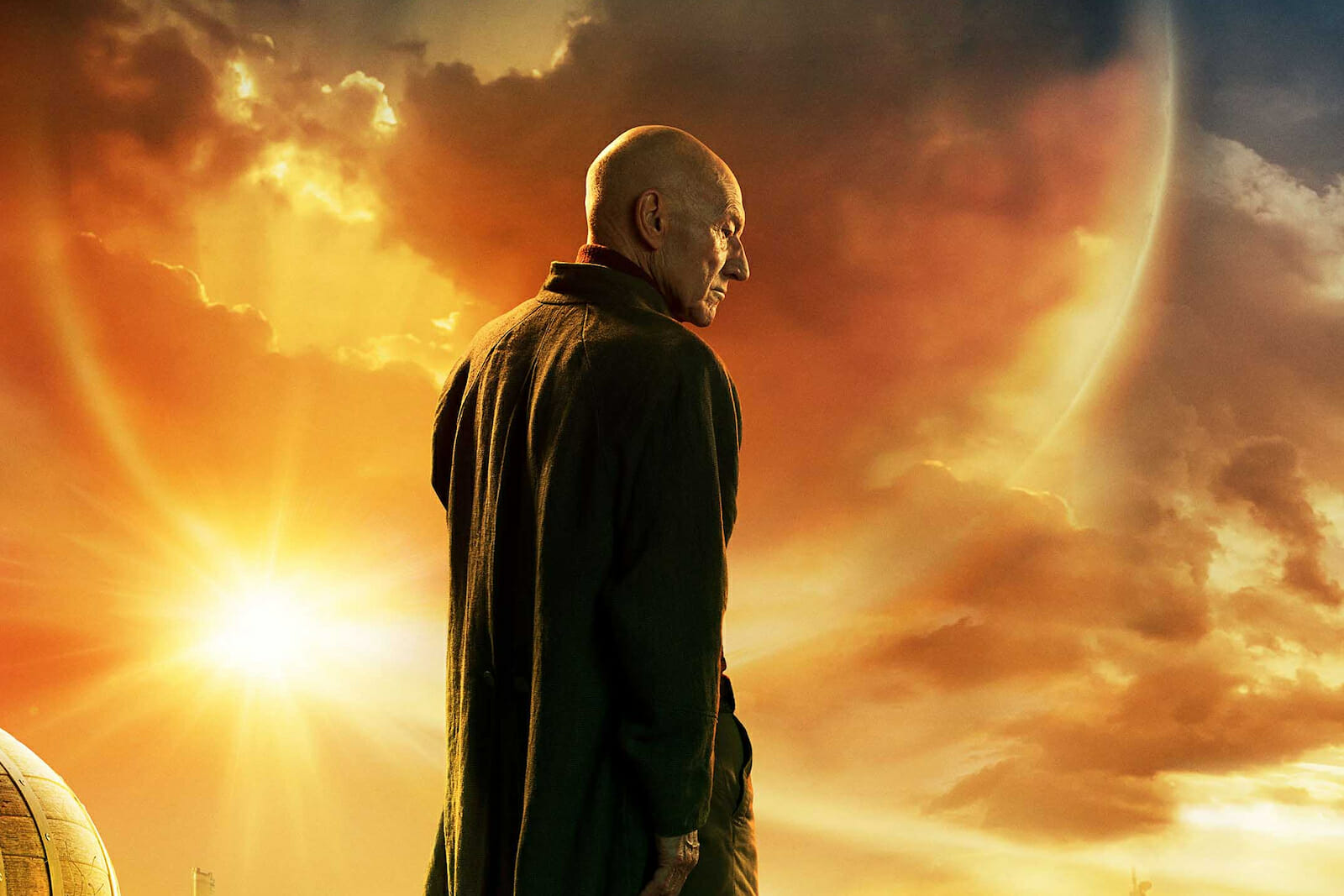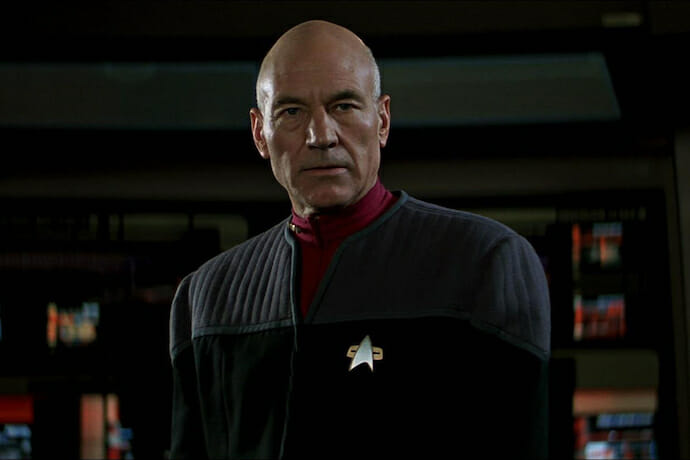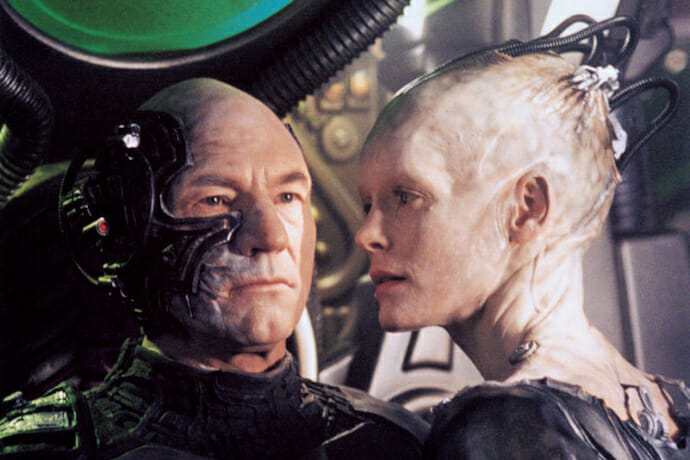
‘Star Trek: First Contact’ is the Perfect Appetizer for ‘Picard’
Anticipation is building for the release of Star Trek: Picard, a new series premiering on the streaming platform CBS All Access. The series promises to continue the story of perhaps the best-loved (sorry, Kirk fans) of all the captains of Trek lore, Patrick Stewart’s iconic Jean-Luc Picard. The show promises to bring back beloved characters while introducing Picard and company to new settings and experiences. Now is as good a time as ever to look back at the esteemed Star Trek franchise, which despite the promise of an exciting movie reboot 10 years ago, seems to be in a state of limbo.
The reboot series, which started off promisingly, faltered with the underwhelming sequel, 2013’s Star Trek Into Darkness. While many (myself included) applauded 2016’s Star Trek Beyond as a return to form, the film itself was a disappointment at the box office. On the TV landscape, Star Trek: Picard hopes to break out big in a way its fellow CBS All Access show, Star Trek: Discovery, could never quite manage. Rumors of another big-screen outing, be it a direct sequel, “soft reboot,” or whatever the hell Quentin Tarantino is talking about all contribute to give us a worrying lack of firm plans in the Trek universe.
But the focus of the new show on Picard specifically may find some Trekkies, old and new, seeking out the best stories of the venerated captain. So imagine my surprise when a recent screening of Star Trek: First Contact at my local Alamo Drafthouse in Ashburn, VA resonated, not simply just as a warm-up to prepare for the arrival of the Picard series, but as an optimistic view of the future that the present world of 2020 desperately needs.
Released in 1996, First Contact was coming off the heels of 1994’s Star Trek: Generations, the first big-screen outing of The Next Generation crew that was supposed to endear fans with its meeting of Captains Kirk and Picard, but was nevertheless received as a middling, mediocre affair. With its follow-up, they wanted the Next Gen crew to have an adventure that was bold and unique to them. It made sense that the most iconic villains of the Picard-era, the cybernetic hive-mind Borg, would be the villains. Additionally, one of the great unmined potentials in Trek lore was the first contact between humans and Vulcans that set humanity on the path towards world peace and space exploration. Though originally the Borg and the Enterprise crew were originally going back in time to the Renaissance, better heads prevailed to finally explain this revolutionary moment in Trek history.
The film, which opens with Captain Picard (Stewart) dealing with his trauma of having been assimilated by the Borg in the iconic Next Gen two-episode arc, “The Best of Both Worlds.” The Borg attack Earth, and despite orders to stay away, Picard goes into the fight. The Borg then time travel to 2063 in order to prevent First Contact and make Earth susceptible to a Borg invasion, and it’s up to the crew of the Enterprise to stop them. Landing on Earth, the crew searches for Dr. Zefram Cochrane (James Cromwell), the man who is the central figure in the events of First Contact and who is hailed by the citizens of Starfleet as one of the greatest men who ever lived. Imagine their shock when Cochrane is discovered to be an alcoholic asshole, whose selfish purpose in building a warp-drive rocket-ship was money and fame. As part of the crew, including Will Riker (Jonathan Frakes, who also directed), Deanna Troi (Marina Sirtis), and Geordi La Forge (LeVar Burton), remain on Earth in order to assist Cochrane so that history may unfold correctly, Picard goes back to the orbiting Enterprise to fight the Borg, along with a stowaway friend of Cochrane’s named Lily (Alfre Woodard). There, the evil Borg Queen (Alice Krige) has captured and seduced android (and fan-favorite) crewmember Data (Brent Spiner) with the temptation of promising to make him human.
While a movie is more than the sum of its scenes, I love many different scenes in First Contact. The smart decision was to split the crew up between aiding Cochrane on the ground and fighting the Borg on the Enterprise. And it is in the latter that the film truly succeeds, in no small part due to Stewart’s Picard. While some bemoan the usually intellectual and conscientious Picard turning into an action hero in this film, I think it really works. Stewart really sells Picard’s visceral anger at the Borg for imprisoning him. In a franchise defined by ultra-civilized humans and emotionless Vulcans, it is a nice change of pace to see a character, particularly one as respected as Picard, consumed with negative emotion. But Picard’s behavior seems more like a condemnation of the concept of vengeance itself. At one point, Picard screams at Lily that “the line must be drawn here: this far, no further! And I will make them pay for what they’ve done!” After that outburst, Lily compares Picard to Captain Ahab, and it is here that he remembers his humanity. But not all of Picard’s scenes are this deep. I love, for example, when he uses the virtual-reality Holodeck to confuse the Borg and ultimately shoot them down with a Tommy Gun in a way James Cagney would be proud of. He, alongside Klingon crewmember Worf (Michael Dorn), must also spacewalk in order to detach part of the Enterprise away from Borg control, in one of the film’s most exciting and gripping sequences.

Alice Krige’s Borg Queen is initially menacing, with just her head and upper torso descending from overhead tubes before connecting to the rest of her body. But over the course of the movie, she begins to ooze sexuality, solidified by Krige’s breathy line delivery. Her purpose is to be a serpent in the garden to tempt poor Data, telling him things like “I bring order to chaos.” When Data protests, the Borg Queen replies that he hasn’t “been properly stimulated yet.” When she gives Data human skin and blows on it, she whispers “Was that good for you?” The Borg Queen could have easily been another boring Trek villain (Lord knows those are a dime a dozen), but Krige brings unique, seducing energy to the role.
Special attention must be given to James Cromwell as Cochrane. It would have been easy to make the character a caricature, but Cromwell depicts him with nuance, conflicted about his disproportionate role in the future of humanity. Cochrane can be brutish, short-tempered and immature at times, and in less capable hands than Cromwell’s, the character would have almost certainly suffered. (Though one can wonder about the possibilities had the filmmakers gone with their original choice to play Cochrane, Tom Hanks.) But Cromwell is able to bring sympathy and dignity to the role, making him fulfill his character arc from unassuming founding father of the future to someone who actively embraces his destiny by the end of the film. First Contact was one of Cromwell’s first roles since his Oscar-nominated breakout performance as the kindly Farmer Hoggett in Babe, a movie that was beloved in my house growing up, as I’m sure it was for many others. Cochrane’s role as a blue-collar guy suddenly swept away into attention and accolades was one that I think spoke to Cromwell in his post-Babe rise to prominence. (Cromwell’s claim that of all the characters he has played, Cochrane is the closest to his real-life personality gives this theory some veracity.) Similarly, the crew of the Enterprise’s adoration of Cochrane presciently resembles everything from paparazzi to star-struck fanboys, watching his every move, desperate for his approval.
“You wanna know what my vision is?” Cochrane asks Riker during a climactic scene. “Dollar signs! Money! I didn’t build this ship to usher in a new era for humanity. You think I wanna see the stars? I don’t even like to fly! I take trains! I built this ship so I could retire to some tropical island filled with naked women. That’s Zefram Cochrane.” It seems ironic that a man like this would be the lynchpin of a future where, as Picard remarks, “the acquisition of wealth is no longer the driving force of our lives, we work to better ourselves and the rest of humanity.” But this is one of the film’s best attributes, turning the unlikeable Cochrane into an endearing hero.

My favorite sequence in the film is the climatic First Contact scene. The events of First Contact happen after a devastating third World War. Like the world of today, the world of 2063 is paranoid and traumatized. When the Borg begin attacking, the people at Cochrane’s base believe it to be a transgression from a long-dormant enemy from a long-concluded war. It is a world in desperate need of something worthwhile, which comes in the form of discovering humanity is not alone in the universe. (“My God, they’re really from another world,” a stunned Cochrane remarks as the alien spaceship lands.) A small group of observers at Cochrane’s camp watch the extraordinary event, and the framing of the scene almost feels biblical. Jerry Goldsmith’s score reaches its crescendo as the mysterious alien visitor takes off his hood to reveal one of the most beloved images in all of Star Trek: the pointed ears of a Vulcan.
“Live long and prosper,” the Vulcan visitor greets Cochrane while doing the iconic salute with his hand. Struggling to replicate the salute, Cochrane instead opts for a handshake, responding to his new Vulcan friend with a simple “Thanks.”
“I envy you…the world you’re going to,” Lily tells Picard at the end of the film, as he and his crew prepare to return to the 24th century. He replies with “I envy you, taking these first steps into a new frontier.” It is this exchange that summarizes the film’s thesis on the relationship between present and future: the present may be bleak, but a better future is worth fighting for. Somehow, a movie made almost a quarter-century ago about time-traveling cybernetic space zombies gave me a boost of optimism I didn’t know I needed. But more than that, it had messages that were pertinent, particularly in an election year: Great people can come from humble, unexpected beginnings. Sometimes, the most transformative people in history are those who initially shun the limelight before accepting their destiny. Definitive moments in our history are not simply just about change, but about transformation. These moments can transcend to become something far beyond their original purpose. The world may seem dark, disjointed, overwhelming and cheerless, but exciting, revolutionary things can be around the corner.
Maybe the new Picard series will channel what made that character so legendary, and what made projects like First Contact succeed so well. I really, really hope that it does. But regardless of the quality of the new show, not only is it fun to revisit these classic fixtures, sometimes they can reveal truths we didn’t used to see, reminding us what endeared us to Star Trek in the first place. So, for 2020 and beyond, live long and prosper.

